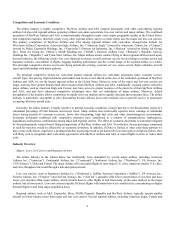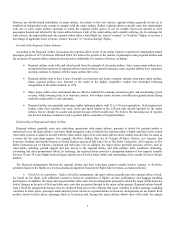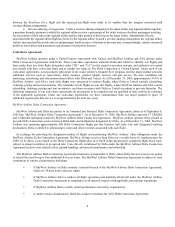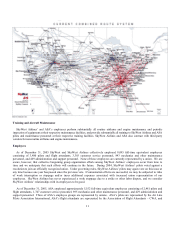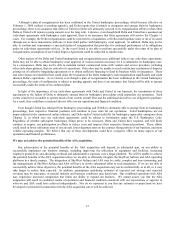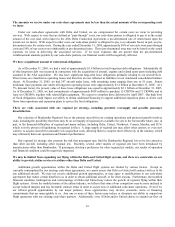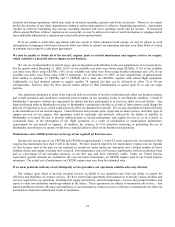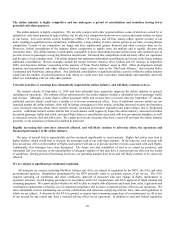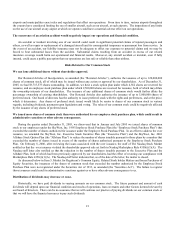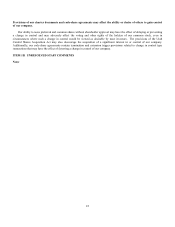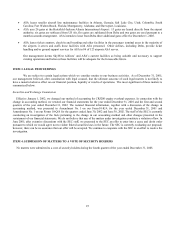SkyWest Airlines 2005 Annual Report Download - page 20
Download and view the complete annual report
Please find page 20 of the 2005 SkyWest Airlines annual report below. You can navigate through the pages in the report by either clicking on the pages listed below, or by using the keyword search tool below to find specific information within the annual report.16
The amounts we receive under our code-share agreements may be less than the actual amounts of the corresponding costs
we incur.
Under our code-share agreements with Delta and United, we are compensated for certain costs we incur in providing
services. With respect to costs that are defined as “pass-through” costs, our code-share partner is obligated to pay to us the actual
amount of the cost (and, with respect to the ASA Delta Connection Agreement, a pre-determined rate of return based upon the
actual cost we incur). With respect to other costs, our code-share partner is obligated to pay to us amounts based, in part, on pre-
determined rates for certain costs. During the year ended December 31, 2005, approximately 50% of our costs were pass-through
costs and 50% of our costs were reimbursable at pre-determined rates. These pre-determined rates may not be based on the actual
expenses we incur in delivering the associated services. If we incur expenses that are greater than the pre-determined
reimbursement amounts payable by our code-share partners, our financial results will be negatively affected.
We have a significant amount of contractual obligations.
As of December 31, 2005, we had a total of approximately $1.8 billion in total long-term debt obligations. Substantially all
of this long-term debt was incurred in connection with the acquisition of aircraft, engines and related spare parts including debt
assumed in the ASA acquisition. We also have significant long-term lease obligations primarily relating to our aircraft fleet.
These leases are classified as operating leases and therefore are not reflected as liabilities in our condensed consolidated balance
sheets. At December 31, 2005, we had 247 aircraft under lease, with remaining terms ranging from one to 18 years. Future
minimum lease payments due under all long-term operating leases were approximately $3.2 billion at December 31, 2005. At a
7% discount factor, the present value of these lease obligations was equal to approximately $2.1 billion at December 31, 2005.
As of December 31, 2005, we had commitments of approximately $838 million to purchase 15 CRJ700s and 17 CRJ900s and to
lease six CRJ200's, together with related flight equipment. We expect to complete these deliveries by April 2007. Our high level
of fixed obligations could impact our ability to obtain additional financing to support additional expansion plans or divert cash
flows from operations and expansion plans to service the fixed obligations.
There are risks associated with our regional jet strategy, including potential oversupply and possible passenger
dissatisfaction.
Our selection of Bombardier Regional Jets as the primary aircraft for our existing operations and projected growth involves
risks, including the possibility that there may be an oversupply of regional jets available for sale in the foreseeable future, due, in
part, to the financial difficulties of regional and major airlines, including Delta, United, Northwest, Comair, Mesaba, and FLYi
which is in the process of liquidating its regional jet fleet. A large supply of regional jets may allow other carriers, or even new
carriers, to acquire aircraft for unusually low acquisition costs, allowing them to compete more effectively in the industry, which
may ultimately harm our operations and financial performance.
Our regional jet strategy also presents the risk that passengers may find the Bombardier Regional Jets to be less attractive
than other aircraft, including other regional jets. Recently, several other models of regional jets have been introduced by
manufacturers other than Bombardier. If passengers develop a preference for other regional jet models, our results of operation
and financial condition could be negatively impacted.
We may be limited from expanding our flying within the Delta and United flight systems, and there are constraints on our
ability to provide airline services to airlines other than Delta and United.
Additional growth opportunities within the Delta and United flight systems are limited by various factors. Except as
currently contemplated by our existing code-share agreements, we cannot assure that Delta or United will contract with us to fly
any additional aircraft. We may not receive additional growth opportunities, or may agree to modifications to our code-share
agreements that reduce certain benefits to us in order to obtain additional aircraft, or for other reasons. Furthermore, the troubled
financial condition, bankruptcies and restructurings of Delta and United may reduce the growth of regional flying within their
flight systems. Given the troubled nature of the airline industry, we believe that some of our competitors may be more inclined to
accept reduced margins and less favorable contract terms in order to secure new or additional code-share operations. Even if we
are offered growth opportunities by our major partners, those opportunities may involve economic terms or financing
commitments that are unacceptable to us. Any one or more of these factors may reduce or eliminate our ability to expand our
flight operations with our existing code-share partners. Additionally, even if Delta and/or United choose to expand our fleet on


